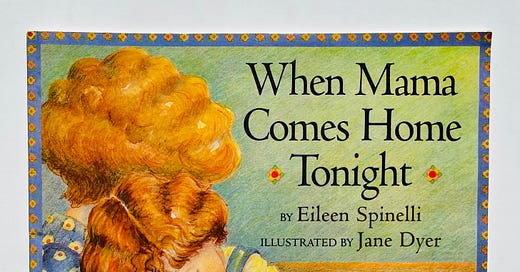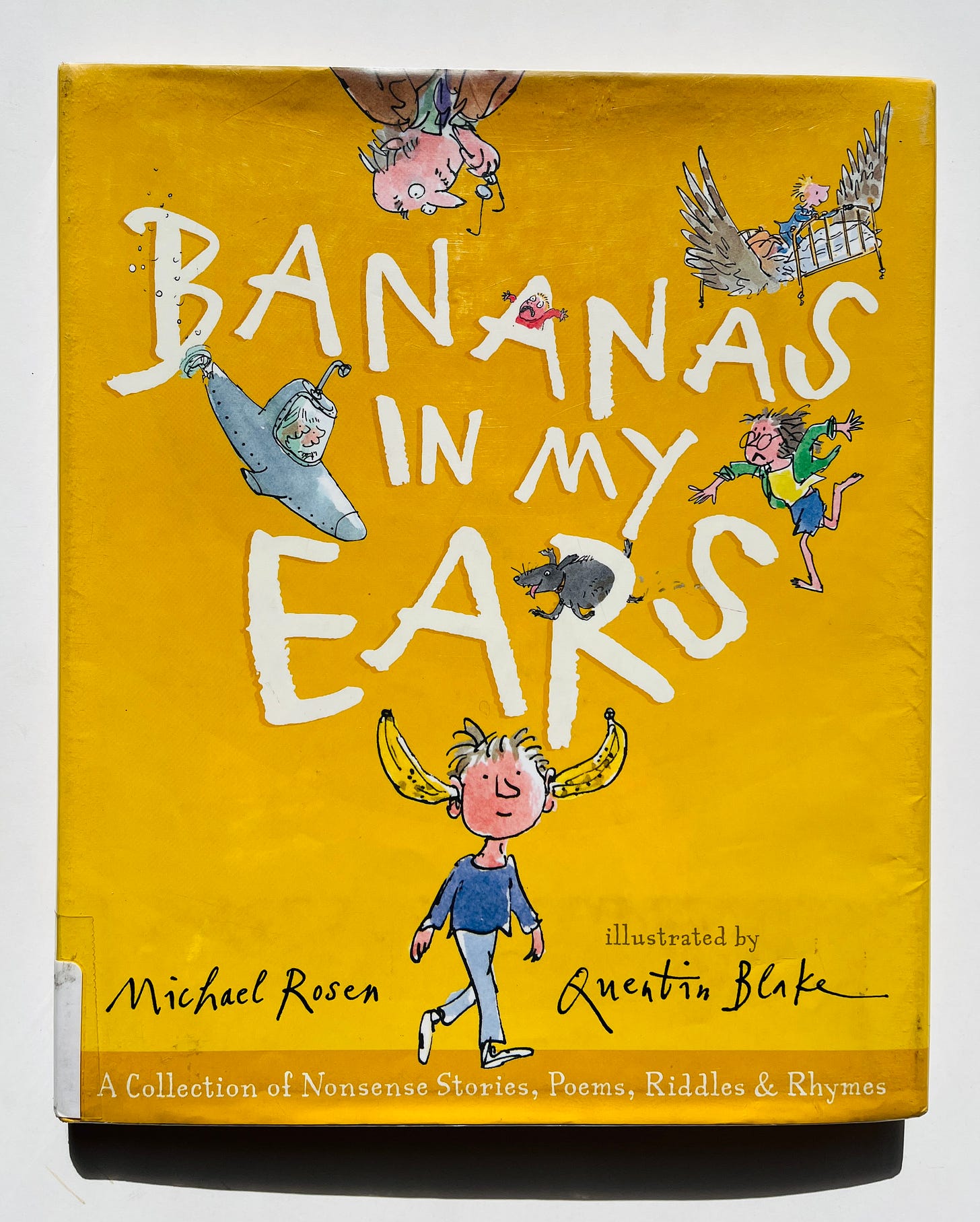Yesterday afternoon my husband came home from work to find me lying face down on our deck with my shirt off, not doing anything more than feeling the sun on my skin and breathing in and out, in and out, over and over and over. (The fact that he approached me like one would a wild dingo devouring a recent kill and very gently asked what the hell I was doing is all the proof of my current mental state that you need.)
It would be easy — the easiest, actually — to send this newsletter twice a week without ever saying anything personal (I know many creators who do just that, and the note on which I wrote my one big newsletter goal for 2024 — Focus relentlessly on service: lots more them, far less me — keeps popping into my mind), but the more I try to pretend I’m not a real human behind this thing, with a real heart, and real challenges, the more I realize I’m just not built that way.
I have written in the past about Glennon Doyle’s belief — at least in her 2014 book, Carry On Warrior: The Power of Embracing Your Messy, Beautiful Life — that her public service is telling people the truth about her insides:
“I considered that maybe the gifts God gave me were story-telling and shamelessness. Because I am shameless. I’m almost ashamed at how little shame I have. Almost, but not really at all.”
God gave me those gifts too, for better or worse, and however much I may try to forsake them — and I try to forsake them on the regular, often in this very newsletter — it never works. It has never once worked, and it probably never will. I can’t hide how I’m feeling even if I put all my effort behind it; I am also very bad at shutting my mouth, and those two things combined mean I end up telling people how I’m feeling and never shutting my mouth.
Lately I feel overwhelmed, frustrated, more anxious than I have in a long time, and even kind of furious, and I admit this so that whatever you’re going through — lugging your own emotional baggage, trying to feel your feelings, trying to stay in your own energetic lane, coping however you cope, struggling (and struggling) — you know you’re not alone.
Is this about books or raising readers? No, it’s not, and I’m sorry-not-sorry about it.
It is about being human — the burden of it, as thinking animals with brains as powerful as ours, but the beauty too: that we exist, so improbably, right here, right now, in this complicated, terrible, gorgeous world, and have the ability to comprehend so much of it along with our complicated, terrible, gorgeous selves.
I’m sending you the strength to keep carrying the things we bear and bring along with us, sometimes forever. I’m sending you the grace to grant yourself patience and care. I’m sending you the space to quiet the noise of your life, even if only for a few minutes, so you can listen to your higher self, that wiser, kinder, more reasonable and loving version of you that exists though we might never understand it.
I’m sending you acceptance, full stop. And balm for whatever hurts the most.
When Mama Comes Home Tonight by Eileen Spinelli, illustrated by Jane Dyer (1998)
This sweet, heartwarming title has long been on my list — and in my rotation at home — of books for when you’re apart. When I’m going to be traveling a lot for work, I always break it out in the days before I leave for a trip, because it’s the exact kind of comfort (illustrated in Dyer’s soft, signature watercolors) my children and I all need.
Less a straightforward narrative and more a gentle journey from moment to moment, this simple and evocative story shows a young child anticipating their mother’s return home, with the repetitive refrain, “When Mama comes home tonight” showing all the tender things they’re going to do when they’re together again (kiss and dance, play, “make three wishes and tell them to the stars”).
I’ll admit to having cried while reading this more than once, which any caregiver who must spend days away from their little ones will understand at some point or another. This reassuring book is a balm for the heart — and not just young hearts, either.
(If you’re interested in more books that address times of separation — whether it’s just for the day, or for longer — check out my list, Books for when you’re apart, which I’ve honed over a decade of being a full-time work-outside-the-home mother.)
Julio’s Magic by Arthur Dorros, illustrated by Ann Grifalconi (2005)
If you’re looking for a unique and imaginative title that showcases a unique skill alongside touching generosity, look no further.
Julio, the son of farmers, wants to be a woodcarver like his elder friend Illuminado, and considers entering a local contest with a big prize. Illimando himself could badly use the prize money but insists that he has never entered the contest because the only person he competes against is himself. He gives liberally of his time and talent, spending hours helping Julio see the animals inside the wood he’s carving. (Grifalconi’s intriguing mixed media collage documents this art form as well as the loving relationship between the boy and the old man.)
I won’t give away the ending, only say that Julio (and any reader) learns an enormous amount along the way: most importantly, that giving is far more important than receiving, and is the true prize, in the end.
Bananas in My Ears: A Collection of Nonsense Stories, Poems, Riddles, & Rhymes by Michael Rosen, illustrated by Quentin Blake (2012)
If you don’t know where to get started with poetry — and it’s okay if you don’t! most people don’t! — nonsense poetry is a great place to begin, and Bananas in My Ears is full of absolute nonsense. (I mean, just look at the cover. When my husband saw it he said, “What the heck is that?” Just another book to add to the thousands you already complain about, dear; nothing to see here.)
Here Rosen offers a smorgasbord of absurdity, humor, and delight in the form of stories, poems, riddles, and rhymes — coupled with Blake’s pen-and-ink illustrations, which are full of the same. Even the most skeptical listener will be hard-pressed to keep a straight face while reading (or listening to) the story of a dog who keeps turning into a potato, amongst other zany characters and nonsensical scenarios.
Along with being downright silly, there is a ton of clever wordplay here — so, those of you whose kiddos enjoy that kind of thing, and I know you’re out there, do not pass Go, do not collect $200, just get this book! — making this an excellent choice for a wide age range… including adults who spot the cover and ask, “What the heck is that?”
A Boy Called Bat by Elana K. Arnold (2017)

This is how my children and I came to read — or, more accurately, tear through — A Boy Called Bat: on a Sunday night, I was browsing the bookcase in my guest room where I keep chapter books intended for read-alouds/when my children are older and can read for themselves, and I plucked this off the shelf.
Fast forward 30 minutes and 1/3 of the book later, and I hadn’t put it down — I really couldn’t put it down; I brought it to bed with me to keep reading — and the next morning I think I woke my eldest up by saying, “I FOUND A GREAT NEW BOOK FOR US TO READ, YOU’RE GOING TO LOVE IT, IT’S ABOUT A BOY AND A BABY SKUNK, LET’S START IT TODAY.” She refused (calmly and in lower case), advocating to finish our current read-aloud first, so we compromised by agreeing to that but also looking on Hoopla to see if Bat was available on audio: it was, and we started listening immediately, and she was hooked, her sister was hooked, and I was waiting impatiently to catch up to the part where I’d forced myself to stop the night before.
This is all to say: this is a highly enjoyable story about a little boy called Bat, whose life is turned topsy-turvy (in the best way) one day when his veterinarian mother brings home an orphaned skunk kit that needs a home for a short time. Bat — who has autism — thrills at the chance to be the skunk kit’s caretaker, and the story centers around his sweet determination to be a good one, as well as all the things in his life that sort of get in the way (his every-other-weekend time with his dad, his mother’s insistence that they cannot keep the skunk kit, his reluctance to trust a potential friend with the baby).
Normally I might find the best part about this book to be the fact that Bat’s autism is a holistic part of the narrative (i.e., this is not “a story about a boy with autism”), which is both unique and refreshing, but no — the best part about this book is the story that just completely sucked me, us, in.
This short and delightful tale (the first in a trilogy) is full of messages about acceptance, friendship, family, and love — it’s the most entertaining book we’ve read in awhile, and that’s saying something.
Thanks for reading.
Sarah







Nothing makes me unsubscribe from something faster than a newsletter with no personal stories. I can get drab booklists and generic "here's what this book is about, decide for yourself if you like it" from anywhere. I can only get what you offer from you. So grateful for all the parts of what you write.
Sarah, I'm sorry you're struggling right now. I wish I could give you a big long hug. Instead I will send you some love virtually. I think it's great you're sharing and being vulnerable and being real. I hope it helps! I'm in awe that you write so many incredibly well-written, thoughtful, interesting, heartfelt newsletters without every missing a beat! It's incredible and YOU'RE AMAZING!!! Don't forget it.